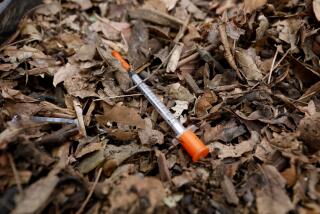Study Indicates Clean Syringe : Program Cuts Spread of AIDS
- Share via
NEW YORK — A report on a major study estimates that the HIV infection rate in New Haven, Conn., fell by a third in just eight months after sterile hypodermic syringes were distributed to drug users.
The findings are further stirring the heated nationwide debate over officially sanctioned needle exchanges. In New York City, which has more than 33,000 AIDS cases, health officials are reconsidering a ban on giving clean needles to addicts.
Citing the New Haven research, the National Commission on AIDS, which has criticized the Bush Administration for ignoring the link between intravenous drug use and AIDS, has recommended lifting restrictions on the distribution of needles.
BACKGROUND: In the unique New Haven study, scientists tracked number-coded syringes that were legally distributed to addicts in a special demonstration program. Needles were returned to field workers, and the researchers, using sophisticated DNA technology, tested them for HIV contamination.
The researchers found that the needle exchange reduced the time that dirty needles were in circulation. Preliminary findings showed that the average dropped from 2 1/2 weeks to six days. The percentage of needles found to be contaminated also fell, to 40% from 67.5%.
Using mathematical models, the researchers projected from these figures a 33% reduction in new cases of AIDS.
“The major significance is the fact we have evidence (that) we have really reduced tremendously the increase in the spread of AIDS in the city of New Haven through the use of dirty needles,” Mayor John C. Daniels said. He said it was necessary to overcome contentions that distributing sterile needles promotes the use of drugs.
“While you were going through that argument, people were dying. The disease was being spread,” the mayor added.
The program of supplying users with sterile needles required special permission from the Connecticut Legislature.
“This is the first study that has rigorously looked at the epidemiology of the needle--where does it go? Where does it come back? How long has it been out?” said Dr. Edwin C. Cadman, chairman of the Department of Internal Medicine at the Yale University Medical School.
“A needle exchange program does not change the number of needles in circulation,” said Edward H. Kaplan, an associate professor at Yale’s School of Organization and Management, the principal investigator evaluating the project. “It increases the turnaround. The length of time any given needle lives on the street goes down.
“The number of injections per syringe must decline, reducing the chance that the syringe becomes infected. The risk of exposure to a needle contaminated with the HIV virus is lessened.”
In the study, a van donated by Yale University carries outreach workers to areas of New Haven where drug use is prevalent. Each new client selects a code name, which is recorded with the number on the needle issued. When a needle is returned to be exchanged for a new one, it is marked with the user’s code name. A participant must bring back a used needle in order to obtain a sterile one.
Participants are told they must not share, rent or sell the needles. They are instructed to sterilize their needles with bleach after each use to avoid contamination.
The system allows researchers to determine if the same person returns the needle--an indication of whether sharing with other addicts has occurred.
“It allows us to trace epidemiology,” said Elaine O’Keefe, director of the AIDS division at New Haven’s Health Department.
THE OUTLOOK: “This program is not a solution to AIDS or to drug addiction,” Mayor Daniels said when the results of the study were announced. “It is one more Band-Aid, but . . . it is a Band-Aid we can not afford to do without. It works.”
“If the data holds up, the New Haven study is a very important advance,” said Dr. Stephen C. Joseph, former New York City health commissioner who started a needle exchange under the administration of Mayor Edward I. Koch. That program has been abandoned by Koch’s successor, Mayor David N. Dinkins.
Needle exchanges are also in operation in Hawaii, Seattle, Portland, Ore., and Boulder, Colo.
The New Haven program has produced a highly encouraging side effect: More than 100 of the needle recipients have entered drug treatment programs, and 100 others are waiting for openings.





